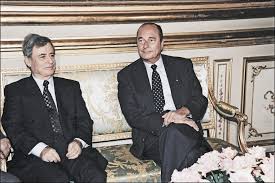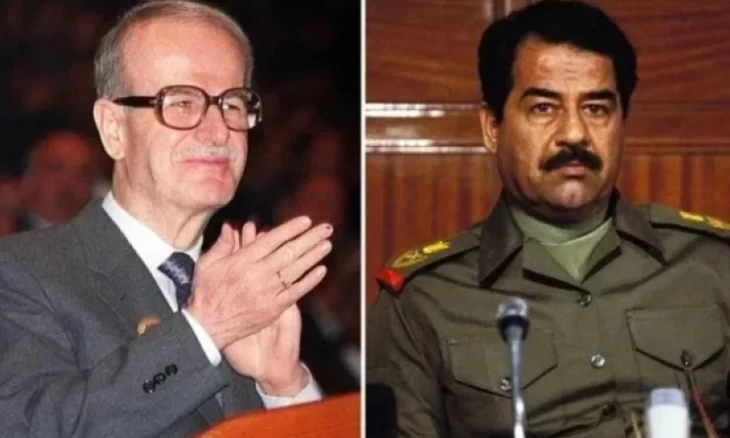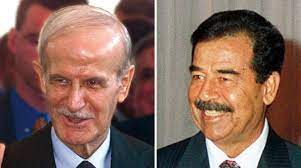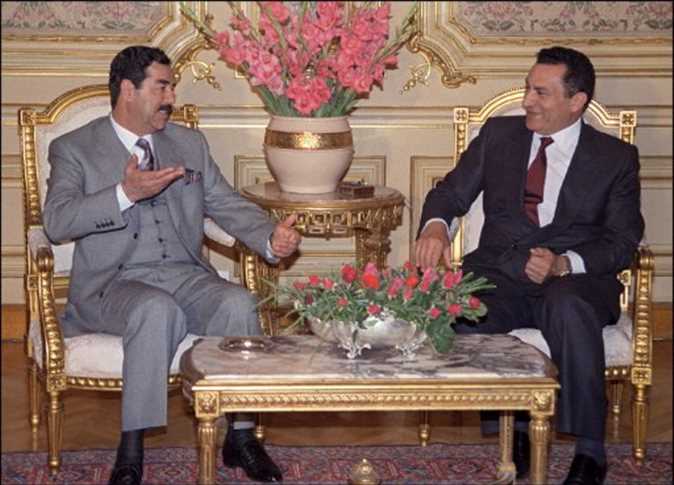In the minutes of his meeting with Abdel Halim Khaddam and published by Asharq Al-Awsat as part of the messages of the Syrian and Iraqi presidents .
Against the backdrop of progress in secret messages between Presidents Saddam Hussein and Hafez al-Assad in 1996, the Syrian president made the decision to send his deputy, Abdel Halim Khaddam, to Paris to meet with French President Jacques Chirac. The purpose of this meeting was to inform Chirac about the decision to reopen the Syrian-Iraqi border, which had been closed since 1982. Assad’s goal in coordinating with Chirac was to mitigate any potential violent American response to the attempt to dismantle Saddam’s isolation.
Additionally, Assad aimed to strengthen trust with the French president after successfully pressuring the United States to involve France in the arrangements to monitor the “Nissan Understanding” concluded in April 1996, following the Israeli “Grapes of Wrath” war in Lebanon initiated by Shimon Peres and resulting in the loss of the prime minister position to Benjamin Netanyahu in mid-1996.
Indeed, Chirac met Khaddam on July 31, 1996, to explain the justification for the Syrian move. According to the minutes of the meeting, published by Asharq Al-Awsat in the third episode of the secret messages between Saddam and Assad, the Syrian president, through his deputy, conveyed to his French counterpart that “the situation in Iraq is now worrisome and resembles a ticking time bomb.” Opening the border, Assad argued, would act as a deterrent to any new aggressive actions by the Iraqi regime.
In response, Chirac acknowledged that the suffering of Iraqis carries serious responsibilities but emphasized the need to avoid pushing the Iraqi people, given their situation, into a movement that could ignite the entire region. However, he added, “The problem today is the difficulty in influencing Abu Uday (Saddam) as people hesitate to engage directly with him. This is why we are in contact with Deputy Prime Minister Tariq Aziz, and there is an agreement. Suddenly, things change because Saddam is acting unpredictably, and no one dares to approach him.”
Chirac, who desired to maintain the confidentiality of the meeting, surprised Khaddam by addressing another matter closely related to Assad’s priorities: the Syrian military presence in Lebanon and the potential for negotiations with the newly appointed Israeli Prime Minister Netanyahu. However, the most surprising aspect was the remarkable offer made by Chirac. He proposed, “If the Israeli army withdraws from southern Lebanon, it would imply that the Lebanese army assumes responsibility for securing the entire border. France has expressed its readiness to deploy observers, but this would also entail disarming Hezbollah, which holds significance for Syria. Naturally, Syria cannot accept this without reciprocation.”
The crucial question arises: What would be the corresponding return? For instance, the withdrawal from the Golan Heights and ensuring Syria’s military presence in Lebanon for a certain period following the operation. These details were outlined in the minutes of the meeting between Khaddam and Chirac, which Khaddam carried along with his papers and documents to Paris in 2005.
On July 7, 1996, Khaddam proposed to Assad the idea of sending a representative to France to convey Damascus’s positions and deliver a message to President Chirac. Assad agreed to the suggestion, and Khaddam met with Chirac on July 31. The following is the text extracted from the minutes: “I would like to extend President Al-Assad’s warm greetings to President Chirac, along with his deep appreciation for the positive atmosphere prevailing in our relations. He affirms Syria’s ongoing efforts to strengthen our ties, achieve partnership, and foster strategic cooperation between our two countries. President Assad is highly content with the message delivered by Foreign Minister Herve Ducharit. Undoubtedly, the relations under Chirac’s leadership mark a new phase, particularly in regard to France’s international and Middle Eastern policies.”
The subject that the President requested me to address pertains to Iraq. President Chirac is aware of our longstanding differences with Iraq dating back to the 1960s. We have endured significant harm as a result of Iraq’s actions. We strongly opposed their unwise policies, both during the war with Iran (1980-1988) and the subsequent invasion of Kuwait (1990). Presently, the situation in Iraq is deeply concerning. It resembles a ticking bomb that poses a threat to regional stability due to the imposed siege and embargo. Therefore, Syria has decided to take the step of reopening the border with Iraq. It is important to note that our border has been closed since 1982.
Naturally, the matter of opening borders will be carried out in accordance with the resolutions of the Security Council. As you may be aware, the international borders between Iraq and Jordan, Iraq and Turkey, and Iraq and Iran are currently open. The rationale behind this new approach is threefold:
Firstly, it is driven by the immense suffering endured by the Iraqi people.
Secondly, external parties persistently instigate conflicts and sow seeds of civil war among certain segments of the Iraqi population. If such a war were to erupt, it would have devastating consequences for the entire region.
Thirdly, we firmly believe that fostering a new and realistic climate of relations between our two countries will act as a deterrent to the Iraqi government, preventing them from engaging in any actions that could jeopardize regional security and stability. Undoubtedly, if normal relations had existed between Syria and Iraq in 1991, it would have been significantly more challenging for a second Gulf War to occur. Our actions are aimed at curbing Saddam’s reckless endeavors.
Of course, considering France’s interests and role in the region, it is our intention to inform President Chirac about this new approach before making an official announcement.
In response, President Chirac stated, “I cannot emphasize enough how pleased I am to hear this news. I have also been evaluating the risks associated with the imposed embargo. France has made significant efforts within the United Nations to make progress with Resolution 986. We have worked in coordination with Tariq Aziz, having met him on two or three occasions. Naturally, it was the Secretary of State who held these meetings. Our assessment of the situation aligns perfectly. While one can certainly hold Saddam responsible for the past events, nobody wants to further burden the Iraqi people, considering their circumstances, with actions that could ignite the entire region. The restoration of normal relations between Syria and Iraq is indeed fantastic news. I have several ideas on how to commemorate this occasion. Therefore, my initial point is that I wholeheartedly support this decision as it is crucial for regional stability. It is possible that both America and Israel may not appreciate this development, but France stands firmly in agreement. Furthermore, I request that the following message be conveyed to President Assad: this aspect of our discussion will remain confidential between us until Syria announces its course of action. I believe Minister Ducharit has something to add on this matter.”
At this point, Ducharette interjected, “There are two significant points to consider. Firstly, Khaddam’s mention of the reestablishment of relations and the opening of borders emphasizes the adherence to the United Nations Security Council resolutions. Secondly, Syria plays a distinctive and significant role in persuading Iraq to comply with international resolutions. We have thoroughly listened to Iraq, hoping that an agreement could be reached on those resolutions. Unfortunately, we have been disheartened by Iraq’s senseless behavior.”
After Chirac’s statement, I responded, “Certainly, we will engage in open dialogue with the Iraqis, prioritizing the benefit of Iraq itself… Saddam Hussein will comprehend this message from Syria because if he fails to grasp it, no one can assist Iraq.”
Following Chirac’s remarks, he continued, “We aim to participate in the peace process. A peace process without Syria is simply impossible. I assure you that France will not adopt any position, particularly concerning the peace process, that may unsettle Syria. Before making any decisions, we will engage in the necessary communications with you. President Al-Assad should be assured that our policies are aligned and will remain so. If there are any differences, we will contact you before reaching any conclusions. I mention this because I recently had a lengthy call with Netanyahu, at his request, and he expressed his intention to call again this week. I found him relatively more flexible compared to his stance 10 or 15 days ago while he was in America. Even (the late Egyptian President Hosni) Mubarak, who met with him, reached out to inform me that he found Netanyahu more accommodating, although his position on the principle of land for peace remains unchanged, and he did not address the matter of the Golan. We believe that negotiating the Golan is crucial in this regard. Netanyahu has expressed his desire to resume the peace process with Syria and Lebanon, but he has not mentioned any preparations he may be undertaking. However, he introduced a new element unlike Peres, who used to emphasize that America alone was sufficient in this process. Netanyahu stated, ‘We want France to intervene in this process.’ He mentioned that you have good relations with Syria, and we wish to leverage and benefit from this situation, while Peres used to assert that America alone is enough for this process. As outsiders to this region, we must work towards peace from within the region itself.”
Chirac continued, “One thing that surprised me was his mention of Israel’s interest.” He inquired, “What does Israel gain from maintaining a military presence in southern Lebanon? While I could understand such a perspective, it may pose a significant problem for Syria. I do not wish to cause any trouble for Syria or fall into a trap. I want France to adopt positions that align with Syria’s agreement. It could be a trap, and that’s why I made it clear in this process: the Golan Heights cannot be separated from southern Lebanon because they are interconnected elements in these negotiations. Therefore, negotiations must involve both Syria and Lebanon.” He added, “He told me he would contemplate this matter and revisit it.”
“If I express this, it’s because instinctively I used to think: If I were in Netanyahu’s position, I would unconditionally withdraw my forces from southern Lebanon, creating a problem and upsetting everyone,” Chirac stated. “I don’t need to tell you that I cannot advise him to take such action, but I believe Syria should not rule out this possibility and should prepare accordingly. If the Israeli army withdraws from southern Lebanon, it assumes that the Lebanese army will secure the entire border. France has expressed readiness to deploy observers, but at the same time, this would entail the disarmament of Hezbollah. This aspect is naturally relevant and important to Syria. Syria, as expected, cannot accept this without any reciprocation. The question is: What would be the return? For instance, the withdrawal from the Golan Heights and ensuring a continued military presence in Lebanon for a certain period following the operation.”
Chirac emphasized two reasons: “First, France will not act against Syria in this matter and will only proceed after consulting with Syria. We value Lebanon and its independence, as well as the special ties between Lebanon and Syria. We will not take any actions that go against Syria’s interests.”
“Secondly,” Chirac added, “this is a hypothesis that cannot be dismissed. Israelis often attempt to engage with those who can assist them, but ultimately, they make their own decisions without concerning themselves with others’ opinions or perspectives, including those of Americans and the French. They believe that the French have good relations with Arab countries and can be of service. Of course, we will not dictate their actions, but what we can say is that the likelihood of withdrawal is low.”
I expressed my gratitude to President Chirac for sharing the information and France’s stance on Syria. I stated:
“Netanyahu aims to alter the rules of the game while maintaining the goal he declared during his election campaign. He met with Mubarak, who sent his foreign minister to Syria. President Assad asked him: What did you gain from Netanyahu? He replied: a change in tone. The President inquired further: Did you obtain any new positions that can serve as a basis for progress? He responded negatively.
Former American envoy Dennis Ross approached us, requesting a resumption of negotiations. President Assad questioned him: On what basis do we restart these negotiations? Ross answered, ‘Without preconditions.’ The president countered, ‘But there are principles and terms of reference for the peace process. We are ready to engage, but we must build upon our existing foundation. We have a commitment from the Israeli side, relayed to us by Warren Christopher, the former US Secretary of State, to withdraw to the June 4, 1967 border. Additionally, there are agreed-upon security arrangements. Starting from this point, we can proceed.’ Ross objected, stating it was impossible. President Assad then asked, ‘So, on what basis shall we proceed? Any alternative basis implies accepting Netanyahu’s program. How can we return to negotiations when they refuse to acknowledge international decisions?’ Ross claimed, ‘They do acknowledge but interpret these decisions differently. They do not reject withdrawal, yet they do not fully accept it.’
Our conclusion is that if Netanyahu does not offer anything to Clinton, how can he provide concessions to Mubarak? Arafat, the late Palestinian President, arrived afterward, deeply disappointed, expressing his frustration and dissatisfaction because they did not grant him anything. In our view, Netanyahu is maneuvering. In Lebanon, he avoids withdrawing in accordance with Resolution 425. For us, complying with Resolution 425 is not problematic. The state there will fulfill its duties and assume responsibilities. However, he aims to achieve two objectives simultaneously. Firstly, he intends to disrupt relations within Lebanon and between Lebanese factions. Secondly, he seeks to create a divide between Syria and Lebanon. Fortunately, everyone in Lebanon is aware of this game. If Netanyahu truly believes in the principle of withdrawal, why does he reject it for Syria and the Palestinian territories? The Americans advised him to change his tone, and he began altering his rhetoric to alleviate concerns arising from his situations, yet he remains entrenched in those situations.
Presently, they have initiated the construction of new roads in the West Bank and resumed settlement activities. How can he claim to pursue peace while pursuing such policies?”
President Chirac expressed, “There is an aspect that needs to be considered. I had met Netanyahu before he assumed power. He visited the Mayor’s House in Paris twice. The impression I got from him back then was that he was intelligent, young, and ambitious, but lacked strong convictions. The issue lies in his poor surroundings. There are military figures seeking revenge, and on the other hand, religious individuals influence him. However, due to his youthful ambition, he desires to remain in power for as long as possible. He aims for a prolonged tenure. Being astute, he understands that his political longevity depends on pursuing peace, as the era of warmongers belongs to the past, while peace advocates represent the future. During his election campaign, he made commitments, and there are pressures that bind him to certain matters, but there is room for him to evolve. What is certain is that he needs to take action. Regarding his positions, there may be some potential for movement in the Golan, but not immediately, rather after some time. This is my personal impression. The only area where he can make immediate moves is Lebanon. Lebanon burdens him greatly without yielding any benefits. I am concerned that one day he might take an initiative that will upset Syria, Lebanon, and everyone involved. Hence, I assert that this possibility should still be considered to avoid surprises.”
I responded to the President’s remarks, saying, “What is noteworthy is that he did not raise this matter with the Americans, and Dennis Ross did not address it either. President Chirac’s characterization of Netanyahu is accurate, but the Prime Minister alone cannot make decisions. The military establishment holds sway. Even if he intends to make a decision, he faces two obstacles: Likud and the religious factions. Arafat shared two incidents where Peres was nearly assaulted by a general. Israel operates as a military and religious institution. Netanyahu wishes to maneuver and project an image of seeking peace and searching, but he knows that true peace cannot be achieved without Syria. The gateway to this peace lies in the Golan. He is aware of this, yet he aims to alter the rules of the game. He wants to demonstrate to the world, ‘Look how oppressed I am, despite my genuine pursuit of peace.'”
President Chirac responded, “Many of Israel’s generals acknowledge the losses incurred in Lebanon and argue that there is no need for their continued presence there. I know of a general who is friends with an Israeli counterpart as they studied together. He asked him, ‘Why do we stay? We are losing on the ground, suffering significant losses, all for nothing.’ The first point I emphasized to Netanyahu is the importance of the Golan in the overall process, as without it, nothing can be achieved. Nevertheless, I reiterate that assumptions should always be considered, and vigilance is essential.”
I interjected, saying, “Let’s imagine waking up one morning to find Israel has withdrawn from the south. Trust me, no one would shed tears over it. However, such a withdrawal should not occur within the framework of negotiations or as a separate peace agreement.”
President Chirac replied, stating, “They are well aware of this, but the challenge lies in waking up one morning and discovering that the Israelis have indeed departed.”
I remarked, “In that case, we will raise a toast to their departure.”
President Chirac inquired, “But what comes next after these elites have left?”
I responded, “Nothing. There is an existing state, but the question now is whether the resistance in Lebanon will cease. No one can guarantee that.”
President Chirac posed another question, “Will Hezbollah then be disarmed? The army may have tactical capabilities, but politically it is not feasible. Syria is the only one capable of achieving disarmament. What does Syria seek in return for such disarmament?”
I replied, “Israel will withdraw on its own, creating a vacuum. In the south, besides Hezbollah and Palestinian factions, there are other groups as well. The media tends to exaggerate the role of Hezbollah. However, this matter is discussed internally, considering Lebanon’s interests rather than Israel’s. Israel aims to create problems in Lebanon, but all Lebanese are aware of this game. Discussing arms and disarmament in advance is an Israeli prerequisite. Netanyahu is resistant to preconditions.”
Chirac stated, “Let me reiterate that the idea of Israel’s unconditional withdrawal may have been an unfounded hypothesis. As you mentioned, the Lebanese army is positioning itself along the border, which poses a problem regarding the presence of Syrian forces in Lebanon. Prince Abdullah and King Fahd have expressed concerns about the fate of the Syrian army when Israel withdraws from the south. In response, I emphasize that all relevant parties should engage in discussions. However, if Hezbollah remains armed, skirmishes will persist, and Israel will target all of Lebanon. This is what some generals are seeking. I don’t believe that many Israeli generals want to maintain their presence. However, there are those who aim to enter all of Lebanon and confront the Syrian army. This scenario would be detrimental to everyone involved. Therefore, if the withdrawal occurs without disarming Hezbollah, it will likely lead to provocations and other complications. On the other hand, if Hezbollah is disarmed, Syria will lose something. There needs to be something in return, such as ensuring a Syrian presence in Lebanon. These might have been aspirations. My desire is for us to establish a strong and close connection.”
I responded, saying, “As President Chirac, myself, and President Assad have emphasized, we aim to strengthen the communication and coordination between us. We see the presence of France in the region as a window of hope amidst the current international situation. This approach necessitates continuous communication, coordination, and dialogue. If the circumstances you described come to pass, we will undoubtedly engage in discussions together. We seek a just and comprehensive peace, with France playing a central role in this process. If any such developments occur, it is only natural for us to reach out to each other and objectively discuss the matter. What’s crucial is to remain cautious of Netanyahu’s maneuvers. He is a smart and ambitious individual, but he also holds strong convictions. While he may attempt to evolve, he may still cling to his beliefs. If he chooses a new path, we will view it positively. Who said there is love between us and Peres? However, it was possible for us to engage in discussions with him and Rabin in the past. We reached points of agreement. If Rabin had not been tragically assassinated, we would have achieved much more since he was better positioned to make decisions compared to Peres. The pressure exerted on Netanyahu is the driving force behind any potential changes.”
Chirac stated, “I would like to address one final point. I have intervened on one or two occasions with President Assad regarding the release of the Israeli pilot, Ron Arad. Perez made extensive efforts but was unsuccessful. Personally, I support this cause. However, it should not be rushed. Therefore, this gesture should be an ongoing part of the peace process. Liberating him before the end of September would greatly contribute to peace.”
I responded, “I cannot say for certain if he is still alive. President Clinton discussed this issue with Assad. Personally, I have been closely monitoring the situation with Hezbollah and our security services. Initially, he was held captive by the Amal movement. However, there was a split within the movement, and the defector leader took him to another location. Subsequently, there was an Israeli raid in that area, and Arad disappeared. We can continue investigating the matter. If we find any leads, we will ensure that France plays a role in the release.”
Chirac replied, “I am referring to Syria’s interest and the interest of peace, not for us to interfere in the matter. I informed Peres that I would handle it, but I did not inform Netanyahu. If you do discover anything, this information is important to Netanyahu and could be part of a comprehensive process. However, if released, it should not occur before the end of September as it could negatively impact the peace process. I am speaking candidly here, but if I were to be asked if I said such things, I would deny it.”




